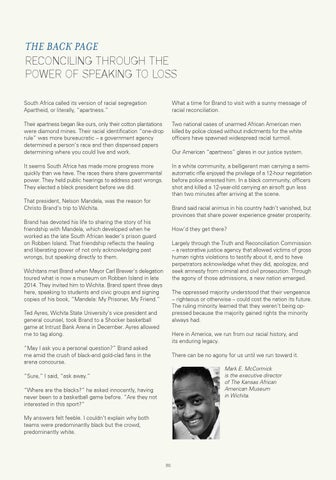THE BACK PAGE reconcIlIng tHrougH tHe Power of sPeAkIng to loss South Africa called its version of racial segregation Apartheid, or literally, “apartness.”
What a time for Brand to visit with a sunny message of racial reconciliation.
Their apartness began like ours, only their cotton plantations were diamond mines. Their racial identification “one-drop rule” was more bureaucratic – a government agency determined a person’s race and then dispensed papers determining where you could live and work.
Two national cases of unarmed African American men killed by police closed without indictments for the white officers have spawned widespread racial turmoil. Our American “apartness” glares in our justice system. In a white community, a belligerent man carrying a semiautomatic rifle enjoyed the privilege of a 12-hour negotiation before police arrested him. In a black community, officers shot and killed a 12-year-old carrying an airsoft gun less than two minutes after arriving at the scene.
It seems South Africa has made more progress more quickly than we have. The races there share governmental power. They held public hearings to address past wrongs. They elected a black president before we did. That president, Nelson Mandela, was the reason for Christo Brand’s trip to Wichita.
Brand said racial animus in his country hadn’t vanished, but provinces that share power experience greater prosperity.
Brand has devoted his life to sharing the story of his friendship with Mandela, which developed when he worked as the late South African leader’s prison guard on Robben Island. That friendship reflects the healing and liberating power of not only acknowledging past wrongs, but speaking directly to them.
How’d they get there? Largely through the Truth and Reconciliation Commission – a restorative justice agency that allowed victims of gross human rights violations to testify about it, and to have perpetrators acknowledge what they did, apologize, and seek amnesty from criminal and civil prosecution. Through the agony of those admissions, a new nation emerged.
Wichitans met Brand when Mayor Carl Brewer’s delegation toured what is now a museum on Robben Island in late 2014. They invited him to Wichita. Brand spent three days here, speaking to students and civic groups and signing copies of his book, “Mandela: My Prisoner, My Friend.”
The oppressed majority understood that their vengeance -- righteous or otherwise – could cost the nation its future. The ruling minority learned that they weren’t being oppressed because the majority gained rights the minority always had.
Ted Ayres, Wichita State University’s vice president and general counsel, took Brand to a Shocker basketball game at Intrust Bank Arena in December. Ayres allowed me to tag along.
Here in America, we run from our racial history, and its enduring legacy.
“May I ask you a personal question?” Brand asked me amid the crush of black-and gold-clad fans in the arena concourse.
There can be no agony for us until we run toward it. Mark E. McCormick is the executive director of The Kansas African American Museum in Wichita.
“Sure,” I said, “ask away.” “Where are the blacks?” he asked innocently, having never been to a basketball game before. “Are they not interested in this sport?” My answers felt feeble. I couldn’t explain why both teams were predominantly black but the crowd, predominantly white.
80.
